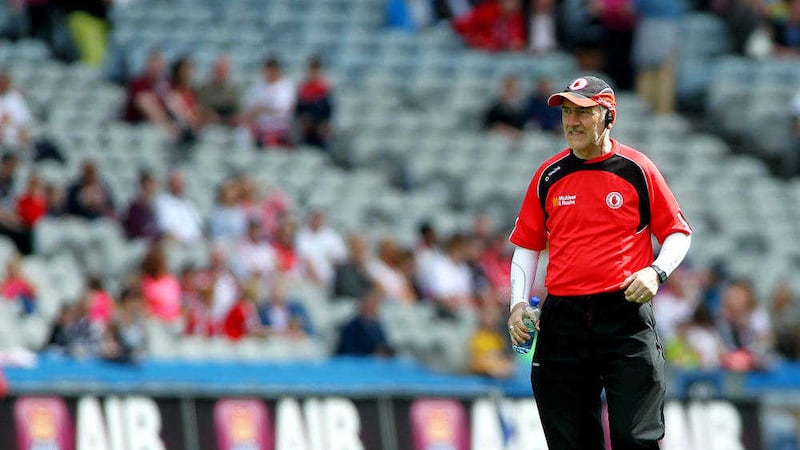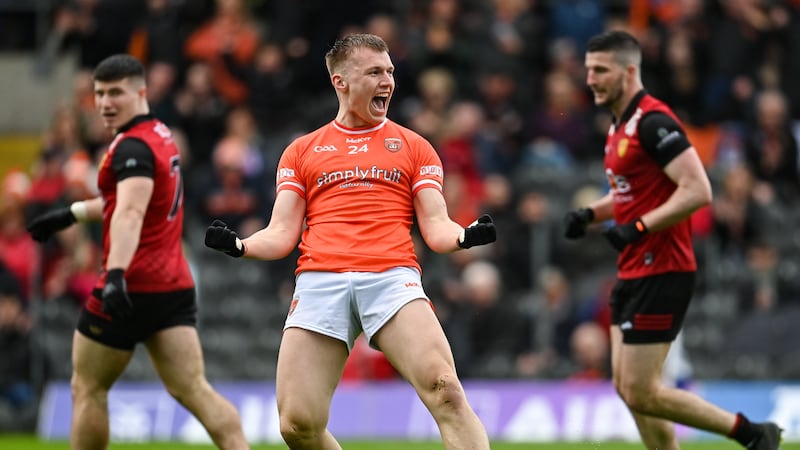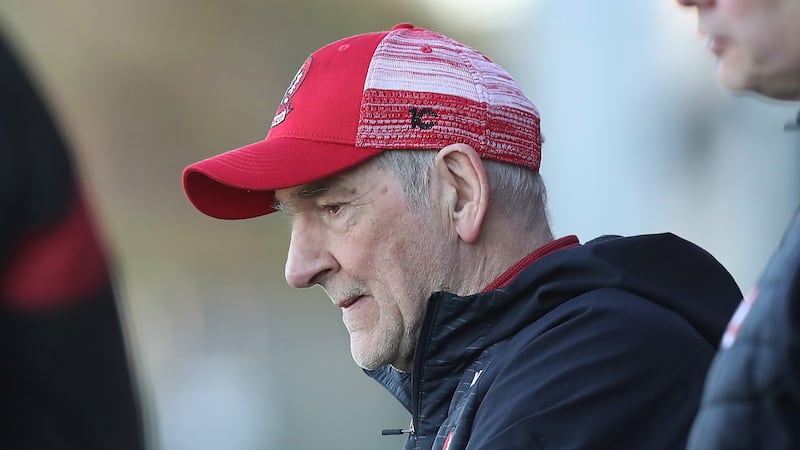THERE were five seconds gone in Healy Park when 22 men piled into a wrestling match at the road end. It set the tone for a miserable afternoon for Tyrone.
While they mounted a few rallies, they were generally bullied around their own turf by Armagh. The afternoon of July 13 2014 ended in a 0-13 to 0-10 defeat for the Red Hands and their earliest Championship exit of recent times.
It seemed to spell the definitive end to an era that included so many classic battles between the two counties. Armagh had already gone full circle, while the game proved to be the last in the white-and-red for both Stephen O’Neill and Conor Gormley.
Even from within his own county, there were calls for Mickey Harte’s head. But then in sticky spells a decade ago, there were Manchester United fans who wanted rid of Alex Ferguson. After all, it had been a few years since he had delivered the treble and the memory of your average soccer fan rarely extends past the previous Saturday.
There were admissions from Tyrone players that they were physically nowhere near it. A long winter was needed in the gym, but they looked a long way off returning to the pinnacle of even Ulster football, never mind the All-Ireland.
Fast forward 13-and-a-bit months and Mark Bradley’s wheeling away from the Canal End, left arm in the air. The cacophonous roar that greets his equaliser hasn’t been heard in seven years and it suggests something very real is afoot. Ultimately, Tyrone’s bid fell short. Kerry got them on the home straight to hold onto Sam Maguire for another few weeks, until Dublin came and took it off them.
The Red Hands were naturally gutted. An All-Ireland final place looked to have been in their grasp when Peter Harte’s penalty gave them the momentum heading into the final quarter of an hour. But once the defeat was left to simmer a while, it became apparent they had made remarkably quick progress.
The gameplan was apparent during the league. It wasn’t nearly as effective on the early season turf. The legs were too heavy yet. But the National League became the breeding ground for an overhaul of Tyrone’s style of play. They were fairly roundly criticised for how it looked at times. Fifteen men behind the ball? It was literally another step from what Donegal had bestowed upon Gaelic football.
It’s always seemed that, no matter what Tyrone do though, they are criticised. Quite how Pat Spillane ever managed to successfully implant the term ‘puke football’ upon such a brilliantly energetic style of play will forever remain a mystery.
It didn’t quite taint the three All-Irelands of the noughties, but it branded that team. And that was hugely unfair. They had a forward line that would have held its own against any in the history of the game. Finishers like Canavan, O’Neill, Mulligan; the playmaker supreme in McGuigan; the tireless, but hugely effective, wing-men Dooher and Cavlan.
The team evolved, but they followed the same basic principles. They defended as a unit and they attacked as a unit. It brought the game into a new stratosphere. Others have taken it further and, possibly, done it harm, but that Tyrone team was only ever good for Gaelic football.
Harte knew what we was getting when he took the reins that November Tuesday evening back in 2002. Like many of the players he was to bring to such success, he had come through the ranks. He was the natural successor to Art McRory and the appointment has more than paid its dividends.
Tyrone might have won an All-Ireland under a different manager. But would they have won three? Would they have stripped that Kerry side down the way they did?
His man-management is revered. Take Owen Mulligan. By his own admission, he wasn’t the easiest to work with. He had been meandering through the 2005 season, starting one week, not the next, until that famous goal against Dublin. But as the Cookstown man revealed in an interview in 2013, it wasn’t the goal that propelled him, but rather the words of his manager.
At training the following week, with Mulligan having dodged his calls for days, Harte pulled him aside. Mulligan feared a rollicking for going AWOL, but Harte told him: “Can you not see how people are talking about this? You have probably scored one of the best goals ever scored in Croke Park. If that doesn’t catapult your season, I don’t know what will.”
Mulligan said: “I could just feel a weight lifting off me. And I thought: right. Let’s bring this game on. People thought it was the goal that did it for me, but it was the wee talk at the start of training.”
Owen Mulligan had a key role in that year’s final. He kicked four points and waited on Peter Canavan’s arrival after winning a high ball for one of the great All-Ireland final goals. Harte helped that great team achieve their potential. That was his greatest achievement.
Last season was only millimetres behind. Tyrone faced serious criticism in the winter of 2014 simply for failing to meet the mark that the previous generation, which still has its presence on the side with Seán Cavanagh and the McMahons, had set.
While he inherited the All-Ireland minor-winning teams of 2008 and '10, their progress was slow. None of the 2010 team started against Kerry last year and only three of the 2008 side had fought their way into the starting XV some seven years later.
Bullied around Healy Park by Armagh, they spent their winter in the gym. They came to summer able to break the tackles. But they also came to the summer supremely conditioned in the legs. Their running game last year, while not to the purist’s taste, was arguably the most effective and impressive of its style the game has seen.
Victory in that game against then-reigning All-Ireland champions Kerry would, to my mind, have been an achievement equal to anything Mickey Harte managed in the noughties. Even taking them that close was a stunning turnaround. And with recent minor and U21 teams starting to feed through another strong crop, they might add yet more silverware before his tenure ends.
It surpassed any of their Ulster title successes and any of their other near misses simply because Harte took a brand new team and moulded them to play a brand new style of football. To do that in such a short space of time will go down as one of Mickey Harte’s greatest achievements with Tyrone.








